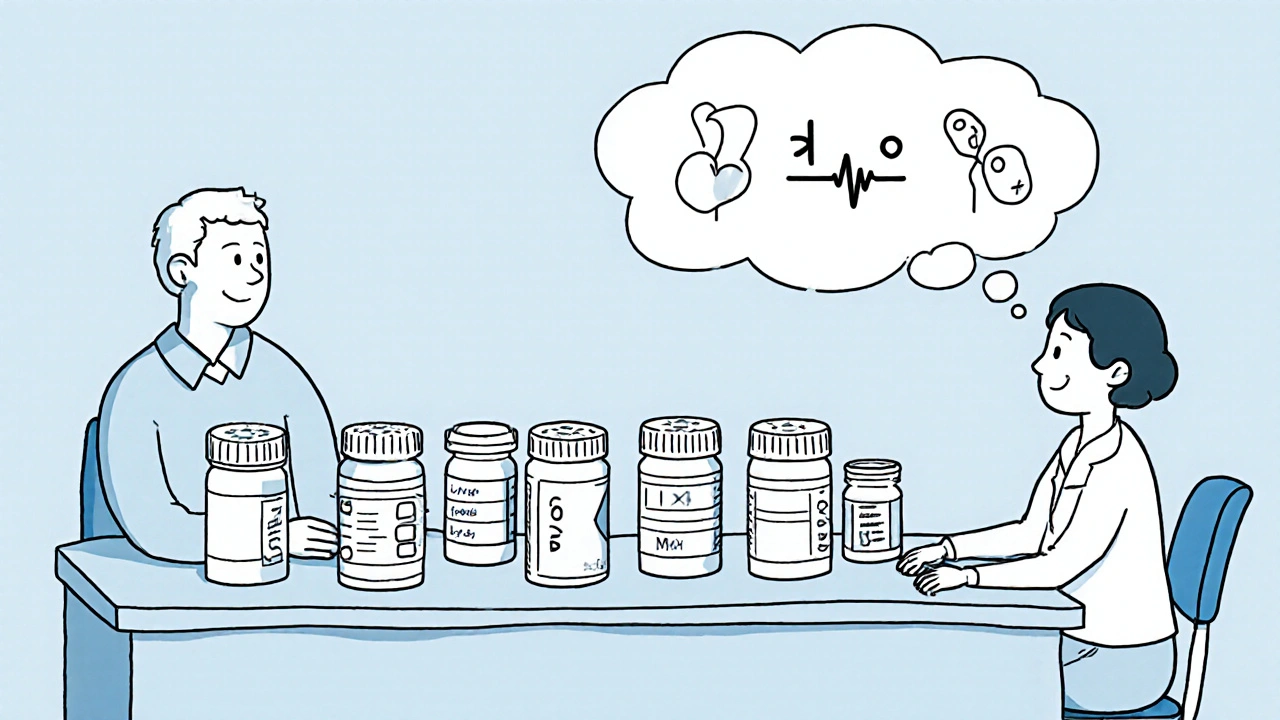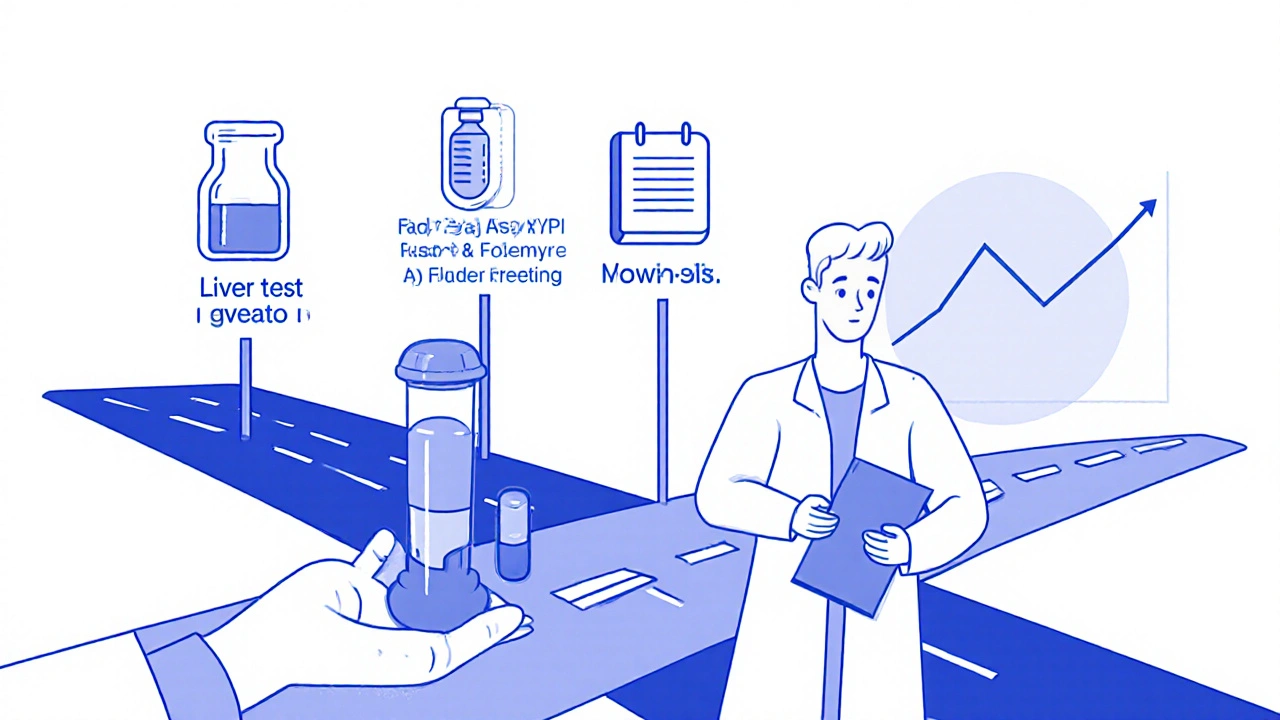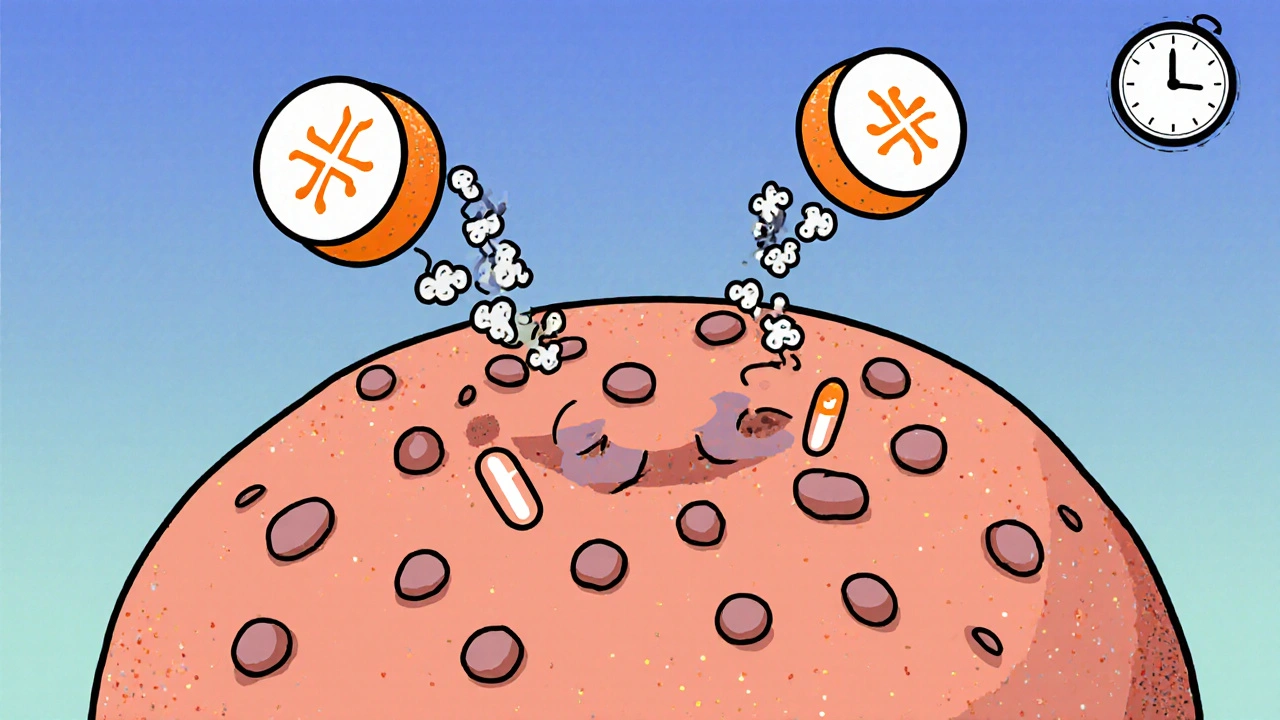Anti-Androgen Comparison Tool
This tool helps you compare anti-androgens based on your specific priorities. Select factors that matter most to your treatment decision.
Flutamide (Eulexin) is a non‑steroidal anti‑androgen that blocks the androgen receptor, slowing the growth of hormone‑sensitive prostate cancer. Many patients wonder if there’s a better option out there, especially as newer drugs promise fewer side effects and stronger efficacy. This guide walks through the most common alternatives, lines them up against Flutamide, and helps you decide which regimen fits your health goals.
Why the right anti‑androgen matters
Prostate cancer cells often rely on the Androgen receptor to fuel growth. When doctors prescribe hormone therapy, they aim to shut down that signal pathway. The choice of drug influences disease control, quality of life, and long‑term safety. A misstep can mean unnecessary liver toxicity, reduced treatment response, or higher treatment costs.
Flutamide (Eulexin) at a glance
- Mechanism: Competes with testosterone and dihydrotestosterone for binding to the androgen receptor, preventing activation.
- Typical dose: 250mg three times daily, taken with meals to improve absorption.
- FDA/EMA status: Approved in the 1980s for advanced prostate cancer; still prescribed in the UK as a cheaper option.
- Common side effects: Hepatotoxicity, nausea, hot flashes, visual disturbances.
- Cost (2025, UK): Approx. £30‑£45 for a month’s supply, making it one of the most affordable anti‑androgens.
Because Flutamide is metabolised by the liver enzyme CYP3A4, it can interact with many other medicines. Regular liver‑function tests are a must, especially if you’re on statins, antifungals, or certain anticonvulsants.
Popular alternatives and how they differ
Newer agents were designed to overcome Flutamide’s drawbacks. Below is a quick snapshot of each.
- Bicalutamide (brand: Casodex) - a second‑generation anti‑androgen with a longer half‑life, allowing once‑daily dosing.
- Nilutamide (brand: Nilandron) - similar potency to Flutamide but associated with visual side effects and occasional lung toxicity.
- Enzalutamide (brand: Xtandi) - a third‑generation agent that blocks androgen receptor translocation and DNA binding, offering higher disease control.
- Apalutamide (brand: Erleada) - approved for non‑metastatic castration‑resistant prostate cancer; noted for lower seizure risk.
- Abiraterone acetate (brand: Zytiga) - works upstream by inhibiting CYP17 enzyme, reducing androgen production; usually paired with prednisone.
All of these drugs target the androgen pathway, but they vary in potency, side‑effect profile, and cost. The next table breaks down the details.
| Brand (Generic) | Mechanism | Approval Year (US/EU) | Typical Dose | Key Side Effects | Monthly Cost (UK) |
|---|---|---|---|---|---|
| Eulexin (Flutamide) | Androgen‑receptor antagonist | 1980 (US), 1985 (EU) | 250mg TID | Hepatotoxicity, nausea, visual changes | £30‑£45 |
| Casodex (Bicalutamide) | Androgen‑receptor antagonist, longer half‑life | 1995 (US), 1997 (EU) | 50mg QD | Hot flashes, breast tenderness, mild liver changes | £70‑£90 |
| Nilandron (Nilutamide) | Androgen‑receptor antagonist | 1992 (US), 1994 (EU) | 300mg QD | Visual disturbances, interstitial lung disease | £55‑£65 |
| Xtandi (Enzalutamide) | Blocks receptor binding, nuclear translocation, DNA binding | 2012 (US), 2014 (EU) | 160mg QD | Fatigue, hypertension, rare seizures | £250‑£300 |
| Erleada (Apalutamide) | Androgen‑receptor antagonist with higher CNS penetration | 2018 (US), 2019 (EU) | 240mg QD | Rash, hypothyroidism, mild fatigue | £260‑£310 |
| Zytiga (Abiraterone acetate) | Inhibits CYP17, reducing androgen synthesis | 2011 (US), 2012 (EU) | 1000mg QD + prednisone 5mg BID | Hypertension, hypokalemia, liver enzyme rise | £320‑£380 |

Decision factors you should weigh
When you sit down with your oncologist, ask yourself these questions:
- Efficacy for your cancer stage: Enzalutamide and Apalutamide have shown survival benefits in metastatic settings, whereas Flutamide is usually reserved for patients who need a low‑cost option.
- Side‑effect tolerance: If you have a history of liver disease, you may want to avoid Flutamide or Abiraterone. For those worried about seizures, Bicalutamide or Apalutamide are safer bets.
- Drug interactions: Since Flutamide and Nilutamide are CYP3A4 substrates, they can clash with many common meds. Enzalutamide induces CYP3A4, which may lower the levels of other drugs you take.
- Cost and insurance coverage: NHS prescription policies often favor the cheapest effective drug. Flutamide remains the most budget‑friendly, but newer agents may be covered for high‑risk patients.
- Convenience: Dosing frequency matters. A once‑daily pill (Bicalutamide, Enzalutamide, Apalutamide) is easier to stick to than a three‑times‑daily regimen.
Practical steps if you decide to switch
- Get a baseline liver panel and hormone profile while still on Flutamide.
- Discuss the chosen alternative’s loading dose (if any) with your doctor.
- Schedule a follow‑up visit within 4-6 weeks to monitor side effects and PSA levels.
- Keep a symptom diary - note any hot flashes, fatigue, visual changes, or blood‑pressure spikes.
- If you move to Abiraterone, remember to start low‑dose prednisone to mitigate mineral‑corticoid deficiency.
Never stop a medication abruptly without medical guidance; sudden hormone fluctuations can cause a PSA surge.

Common pitfalls and how to avoid them
- Skipping liver tests: Even if you feel fine, liver toxicity can be silent. Test every 2-3 months for Flutamide and Nilutamide.
- Ignoring drug interactions: Bring a full medication list to each oncology appointment. Enzalutamide can lower the efficacy of warfarin, for example.
- Choosing cost over efficacy in high‑risk disease: Advanced metastatic cancer often requires a more potent agent like Enzalutamide; cheaper isn’t always better.
- Not addressing steroid need with Abiraterone: Skipping prednisone can lead to adrenal insufficiency.
Bottom line
The landscape of anti‑androgen therapy has expanded dramatically since Flutamide first hit the market. While Flutamide remains a viable, low‑cost option for select patients, newer agents such as Enzalutamide or Apalutamide often provide stronger tumor control with more convenient dosing. Your choice should balance disease aggressiveness, side‑effect tolerance, drug interactions, and financial considerations. Partner with your healthcare team, keep labs up to date, and monitor how you feel - that’s the most reliable way to ensure the therapy you pick truly works for you.
Frequently Asked Questions
Is Flutamide still prescribed in the UK?
Yes, the NHS continues to fund Flutamide (Eulexin) for patients who need an affordable anti‑androgen, especially when newer agents aren’t clinically required.
Can I take Flutamide with statins?
Both drugs are metabolised by CYP3A4, so there is a moderate risk of increased statin levels. Your doctor may lower the statin dose or choose a different lipid‑lowering agent.
What makes Enzalutamide stronger than Flutamide?
Enzalutamide blocks the androgen receptor at three points - binding, nuclear translocation, and DNA attachment - whereas Flutamide only blocks the binding site. This triple blockade yields better prostate‑specific antigen (PSA) suppression.
Do I need steroids with Abiraterone?
Yes. Abiraterone suppresses cortisol production, so low‑dose prednisone (5mg twice daily) is recommended to prevent adrenal insufficiency and mineral‑corticoid excess.
Which anti‑androgen has the lowest seizure risk?
Bicalutamide and Apalutamide have the lowest reported seizure rates. Enzalutamide carries a small but notable risk, especially in patients with a history of seizures.

12 Comments
Darryl Gates
October 17 2025
Hey there, it sounds like you’ve done a solid job gathering the data on Flutamide and the newer agents. If you’re considering a switch, start by ticking off the baseline labs – liver panel, PSA, and hormone profile – before you make any changes. Keep a symptom diary; noting even mild hot flashes or fatigue can help your oncologist fine‑tune the dose. Remember that the once‑daily options like Bicalutamide or Enzalutamide often improve adherence, especially if you’re juggling three pills a day now. Stay proactive and keep the conversation open with your care team – they’re there to help you find the best balance between efficacy and quality of life.
Kevin Adams
October 17 2025
Behold! The very essence of choice teeters on a razor's edge – Flutamide versus the titans of modern therapy…
Chris Beck
October 17 2025
Look the cheap drug might save a few quid but you’re trading your liver for pennies not worth it.
Sara Werb
October 18 2025
Wake up! The pharma elites push Flutamide because they want you dependent on cheap meds while they hoard the big‑ticket drugs… They’re hiding side‑effects on purpose.
Russell Abelido
October 18 2025
Absolutely, navigating anti‑androgen choices can feel overwhelming.
You’ve already laid out a clear table that compares mechanisms, doses, and costs, which is a fantastic start.
What matters most is how each drug aligns with your personal health profile – liver function, cardiovascular risk, and daily routine.
If you have any history of liver disease, steering clear of Flutamide or Abiraterone is prudent, and opting for Bicalutamide or Apalutamide could spare you from hepatic worries.
On the other hand, if seizure risk haunts you, Bicalutamide and Apalutamide indeed have the lowest reported rates, making them safer companions.
Cost is another big factor; while Flutamide is the budget‑friendly option, newer agents often receive NHS funding for higher‑risk patients, so checking your insurance coverage is key.
Convenience shouldn’t be underestimated – swapping a three‑times‑daily schedule for a once‑daily pill can dramatically improve adherence and quality of life.
Don’t forget the importance of regular monitoring: liver panels every 2‑3 months for Flutamide and Nilutamide, blood pressure checks for Abiraterone, and PSA trends for any therapy.
Keeping a symptom diary, as you suggested, helps catch subtle side‑effects like mild fatigue or occasional hot flashes before they become problematic.
When you discuss with your oncologist, bring that diary and your lab results – it turns the conversation from speculative to data‑driven.
If you decide to transition to Enzalutamide, be aware it can induce CYP3A4 and may lower the efficacy of other meds you’re taking, so a medication review is essential.
Should you move to Abiraterone, remember the low‑dose prednisone is not optional; it protects you from adrenal insufficiency and mineralocorticoid excess.
Every drug has its trade‑offs, but you’re empowered by the knowledge you’ve gathered, and that’s the strongest weapon in this battle.
Take your time, ask for a second opinion if you need one, and trust that your care team is there to guide you through each step.
Above all, listen to your body – it will often give you the clearest signals about which regimen feels right. 😊
Steve Holmes
October 18 2025
Great points! I’d add that some patients also benefit from scheduling their blood work early in the morning to catch diurnal PSA variations – worth asking about.
genevieve gaudet
October 18 2025
It's interesting how the NHS still funds Flutamide, showing a balance between accessibility and medical advancement. Many patients appreciate a drug that doesn’t break the bank while still offering decent control. Of course, cultural attitudes towards risk and cost differ from the US, where newer agents are often pushed in the name of "best care". Whatever the choice, staying informed is the best way to navigate the system.
Michael Dalrymple
October 18 2025
Indeed, the interplay between health economics and patient outcomes warrants careful consideration; clinicians should present both efficacy data and cost implications transparently to facilitate shared decision‑making.
Katie Henry
October 18 2025
Thank you for this comprehensive and insightful analysis.
Joanna Mensch
October 18 2025
While the summary is thorough, keep in mind that many of these studies are funded by the manufacturers, which may bias the reported safety profiles.
RJ Samuel
October 18 2025
Honestly, I think the hype around Enzalutamide is overblown – cheaper options work fine for most men, and the side‑effects can be a nightmare.
Nickolas Mark Ewald
October 18 2025
That’s a fair view; cost and side‑effects are real concerns, and each patient’s situation should guide the final choice.